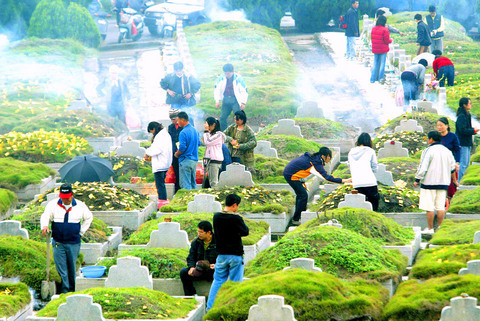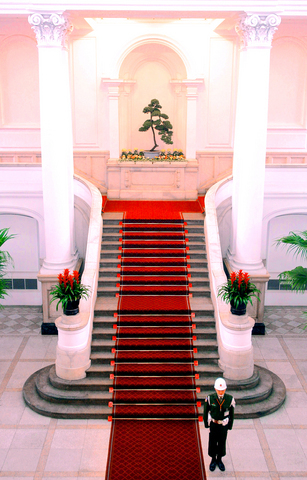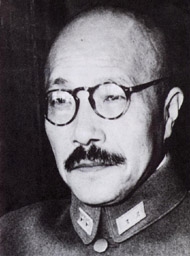It’s not just a date in Taiwan, but a national holiday. The day commemorates the 1947 massacre of 27,000 Taiwanese by KMT troops from China, which followed a failed revolt instigated by the KMT’s rapacious occupational policies. It’s always an uncomfortable time for the capitulationist KMT party, which still wields considerable influence in Taiwan and indeed holds a majority in the Taiwanese legislature.
Interesting then, how the English-language pro-KMT China Post tries to paper over the massacre:
As a matter of fact, it is not important to find out the chief culprit. He may be Gen. Chen Yi, the administrator-general of Taiwan from 1945 to 1947. He may be Keh Ching-en, Chen’s chief of staff. He may be Maj. Gen. Liu Yu-ching, the commander of an infantry division sent to Taiwan from China to "suppress" what was considered a rebellion. He may be Chiang Kai-shek, the head of state, as [a new] special report charges. The fact is that they are all dead, and it’s of no practical use to blame any of them, unless the writers of the [latest] report and the man who commissioned it had some ulterior motive.
Just who exactly does the China Post think they’re kidding? Of course it matters whether Chiang Kai Shek, former dictator of Taiwan, was responsible for the February 28 Massacre. It matters a great deal whether Chiang Kai Shek was a decent leader who simply made an error in judgement in appointing a bad governor to administer Taiwan, or whether he was chief architect of an atrocity. If the former is true, then he deserves our sympathy. If the latter, his portrait should immediately be removed from Taiwan’s currency, public schools and government offices. Mass murderers do not merit statues in public places, nor should roads or buildings be named in their honor. There is no Adolf Hitler International Airport in Germany, for obvious reasons. (And let me be clear: Chiang Kai Shek was no Hitler, but 27,000 people winding up murdered isn’t small potatoes, either.) If the Generalissimo was behind the massacre, then I can’t for the life of me see why there should still be a Chiang Kai Shek International Airport.
The China Post‘s editorial goes on:
The [new] report is supposed to be a result of historical research. The writers are all historians, one of whom heads the Academia Historica. It seems that they forget what history is. History is understanding. History is a dialogue between the past and the present. History does not pass judgment. History is what notable events historians record just as Leopold von Ranke says "wie eigentlich gewesen (as is truly seen)."
What blather is this? "History does not pass judgement"? Of course it does! It’s history’s job to tell us who’s responsible for what. What did Nixon know, and when did he know it? Some historian somewhere positively SALIVATES over the possibility that he’ll be the one who finds the memo that definitively answers that question. Regarding the matter of World War I, historians initially assigned the lion’s share of the blame to the Central Powers. Twenty or thirty years later, revisionist historians found evidence that the war wasn’t caused by evil intent, but by a series of misunderstandings and tragic blunders. And about twenty years after that, the counter-revisionists found new evidence that once more pointed to prior German militarism as the war’s prime motivator.
And so it goes. Future evidence will be found to strengthen the claims of one side or another, for the study of history never ends. But the China Post‘s point that history is "a dialogue between past and present" eludes me. Yes, history can speak to me, at least in a metaphorical sense. And yes, people of today can ask questions about the past that perhaps never occurred to those who came before us. But precisely how does claiming that history is a dialogue between past and present invalidate the latest study regarding Chiang Kai Shek’s culpability?
If anything, this claim is an unintended DEFENSE of the motives of the authors of the study. For it is THEY who are engaged in dialogue with the past, asking tough questions – questions that were forbidden during the dark days under dictatorship.
There is then the obligatory attack on Taiwanese President Chen Shway-bian:
President Chen Shui-bian spoke at a meeting to mark the publication of the special report. He cited Chiang Kai-shek as the chief culprit. Is he one of those few people wishing to know who masterminded the massacre? Is it part of his hate-China campaign?
First, the China Post implies that few Taiwanese are interested in knowing the truth regarding the massacre. I have no reason to know whether this is true or not. But even if it is, how does it invalidate the question? Discovery of the truth, like discovery in general, is always pioneered by the few. Galileo was one of "those few wishing to know" about the heliocentric solar system. Why should scorn be heaped upon Galileo for wanting to know what most others were too busy or uninterested in learning?
The statement about Chen hating China is one of the reasons why I’ve avoided using the term, "pro-China" to describe the KMT and its political allies. For if one faction is pro-, then it’s natural for most to assume that the other side must be anti-. At that point, it’s too easy to characterize the "anti-China" parties as haters.
But seekers of Taiwanese independence are not necessarily China haters, any more so than young adults moving away from home are haters of their parents. It’s possible to like China (or ones parents) without wanting to live under the same roof as them.
The China Post feels that the next point is important, for it’s mentioned in Joe Hung’s column as well:
The people of Taiwan are not hateful people. Nor are they vengeful people. They know hatred makes everybody unhappy.
It’s indeed proper to point out that the Taiwanese people have not been hateful or vengeful, and have not visited revenge upon Chiang Kai Shek’s descendants. For Taiwan’s former dictator has been dead many years, and whatever his responsibility for the 228 Massacre was, his grandchildren are blameless of the crime.*
But the implication here is not that the Taiwanese should be congratulated for the extraordinary decency they’ve shown to the Chiang family, but that those asking questions should be condemned for bringing up painful periods of history. Let sleeping dogs lie; don’t threaten the peace of Taiwan. Murderers of 27,000 people mustn’t be blamed, for blame is something to be reserved for those who ENQUIRE about the guilt or innocence of historical figures.
Finally, the China Post closes with a plea for forgiveness:
In fact, they believe the feud between islanders and mainlanders that the February 28 Incident begot was disarmed when President Lee Teng-hui proclaimed Peace Memorial Day in 1998. He apologized for the massacre on behalf of his Kuomintang government.
The massacre should not be condoned, but what is needed is forgiveness, which does not seem to be included in the dictionary of President Chen and those who wanted to publish the special report.
A few points here. As a pro-KMT paper, it’s in the China Post‘s interest to argue in favor of forgiveness for the KMT. Let’s face it: it’s a tough job politically to get people’s votes after you’ve massacred their grandparents. People don’t usually forget little things like that.
This doesn’t mean that the China Post is necessarily wrong in asking people to move on; it just means that they’re not a disinterested party in the discussion. At the same time though, one should note that the China Post has no trouble demanding additional Japanese apologies for World War II, yet reflexively shrinks from calling for KMT apologies for the 228 Massacre. Former KMT leader Lee Teng-hui (whom the China Post openly despises) apologized ONCE they say, and that ought to be good enough for everybody**.
One last point, a point about forgiveness. Christians might read and be sympathetic to the China Post‘s calls for forgiveness, because it’s what their religion instructs them to do. Sometimes I get the sense that in America this is given a bit too freely, as illustrated by the parents of a school shooting victim I once saw on TV, who tearfully stated in front of the camera that they didn’t hate the perpetrator, and that they forgave him.
That interview was conducted on the same day their son was murdered.
The same freakin’ day. I’m sorry, that’s not godly; that’s downright creepy.
I’ve since become slightly familiar with the Jewish attitude towards forgiveness, which is a little more grudging than that of Christians. Jews too, believe that forgiveness is an imperative, but that the perpetrator must first apologize, and then promise not to repeat the transgression. Only then, can they ask forgiveness from the victim. At that point, only the victim – not his friends, not his family, not even God Himself – can grant that forgiveness.
It logically follows from this that murder is perhaps the one truly unforgivable sin.
Why?
It is unforgivable because only the victim can grant forgiveness. But once murdered, the victim is NO LONGER ALIVE to offer that forgiveness.
Agree with that approach or not, it’s something to think about the next time some huckster comes by opportunistically demanding from you forgiveness on the cheap.
* The Chiang family may be blameless for the crimes of Chiang Kai Shek, but they are not above using the force of the law to bludgeon those who would learn the truth. The editorial also states that John Chiang has mounted a lawsuit against academics who would dare to look at the historical record and suggest that his grandfather may have fallen somewhere short of sainthood. Perhaps Mr. Chiang should be reminded that the study of history should be conducted using reason, research and argumentation, rather than bailiffs, judges and 154 million dollar libel suits.
** This brings to mind a Finnish joke I once read in Ann Landers or Dear Abby. A woman asks her husband of twenty years why he never says, "I love you." The man replies, "I told you that the day we were married. Why should I have to repeat myself?"
UPDATE (Mar 4/06): The Taipei Times had an account the February 28 commemmoration, along with KMT chairman Ma Ying-jeou’s appearance at same:
Ma, who spoke in broken Hoklo, was heckled by the audience…
He spoke in Hoklo (the native Taiwanese language), rather than Mandarin? Wonder how his Hoklo compares to the pandas?
OK, cheap shot. Anyways, the hecklers called the capitulationist chairman a "slave of China", and shouted, "Long live the Republic of Taiwan."
As Rodney Dangerfield used to say, "Tough crowd, tough crowd."


